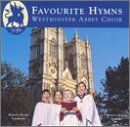| All Artists: Westminster Abbey Choir, Baker, Neary Title: Favourite Hymns Members Wishing: 0 Total Copies: 0 Label: Griffin (Qualiton) Release Date: 7/25/2000 Album Type: Import Genres: Special Interest, Pop, Classical Styles: Vocal Pop, Opera & Classical Vocal, Historical Periods, Baroque (c.1600-1750), Classical (c.1770-1830), Sacred & Religious Number of Discs: 1 SwapaCD Credits: 1 UPCs: 675754236229, 5027822401827 |
Search - Westminster Abbey Choir, Baker, Neary :: Favourite Hymns
 | Westminster Abbey Choir, Baker, Neary Favourite Hymns Genres: Special Interest, Pop, Classical
|
Larger Image |
CD Details |
CD ReviewsHymn singing as it should be Mark Swinton | 01/17/2002 (5 out of 5 stars) "This is a very fine recital drawn from the core of the church and cathedral choir repertoire. Martin Neary proves here (perhaps more convincingly than anyone else) that a good hymn can be just as magical as a through-composed anthem for choir alone, and that the repetition of a single tune over verse after verse need not be a dull experience.The hymns and tunes selected are indeed among the best-loved works in English church music. "O God, our help in ages past," "Love Divine," "Eternal Father, strong to save," "Be thou my vision," "Guide me, O thou great Redeemer" and the eventide chestnuts "Abide with me" and "The day thou gavest" are all bound to be the most recognisable even to those who are not regular churchgoers. Some of the Victorian composers have immortalised the cream of their talent in such hymns as "The King of Love my shepherd is" and "O thou, who camest from above." Purcell's tune "Westminster Abbey" - extracted from his anthem "O God, thou art my God" and set to the words "Christ is made the sure foundation" - shows how a stroke of inspiration of long ago can survive endless musical change by being adapted and absorbed into hymnody. Another adapted work is Hubert Parry's hymn "O Praise ye the Lord," actually the final part of an extended anthem ("Hear my words, ye people") and is presented on this disc in its original form, making for an interesting and refreshing change to the repetitive verses of the rest of the collection. Completing the programme are settings that fall more definitely outside of the realms of congregational singing: the powerful "Kontakion of the Dead" to an ancient tune and harmonisation from Kiev; the moving Air from County Derry set to the verse "I would be true" for unaccompanied boys voices (as sung by these very choristers at the Funeral of Princess Diana in 1997); Martin Neary's little tune "Studland" written for the blessing "May the Grace of Christ our Saviour;" his lovely arrangement of Sebastian Temple's "Make me a channel of your peace" (also sung at the Diana funeral) is here as well. Each item is a gem in its own right.In this performance, each gem is polished to a high standard. Contrast is effectively made by the use of subtly different forces for different verses - there is an appropriate use of boisterous tenors and basses in "O worship the King" at the verse "O tell of his might," and a plethora of soul-stirring unaccompanied verses, particularly in "Praise to the Holiest in the Height." (I would challenge anybody to find a more moving moment in hymnody, achieved with such utter simplicity, than the performance of "And in the garden secretly, and on the Cross on high, should teach his brethren, and inspire to suffer and to die" as it is on this disc.) This is not to say that Martin Baker's accompaniments are not another wonderful element in the performance: for instance, his clever doubling of the tune at a low octave in "Who would true valour see" for the words "No lion can him fright; he'll with a giant fight." On the subject of words, every single one is treated with care and attention to its meaning, individually and in context - the ensemble is finely honed and the enunciation is immaculate. Martin Neary draws every ounce of poetical significance from the words in these hymns, making real sense of them and allow them to speak as music, not simply as long lines of verse to get through as quickly as possible (which is often the problem arising with hymn singing in many churches today). As a finishing touch, several hymns have descants and alternative harmonisations, many of them supplied by Neary, who knows how to make them effective, stunning and highly original. An ensemble of trumpets and drums joins the Abbey Choir and organ for the performance of "All people that on earth do dwell" in the festive arrangement by Vaughan Williams - this is as stirring as many of the other hymns are moving.This collection is a sample of hymnody that (in my humble opinion) far outweighs others I have encountered. There's a certain joy in listening to these performances - a joy that somehow remains fresh on repeated hearings. An inspired and inspirational programme: most warmly recommended!"
|

 Track Listings (20) - Disc #1
Track Listings (20) - Disc #1